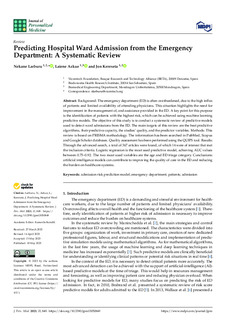| dc.rights.license | Attribution 4.0 International | |
| dc.contributor.author | azkue, laiene | |
| dc.contributor.other | Larburu, Nekane | |
| dc.contributor.other | Kerexeta, Jon | |
| dc.date.accessioned | 2024-02-02T08:53:06Z | |
| dc.date.available | 2024-02-02T08:53:06Z | |
| dc.date.issued | 2023 | |
| dc.identifier.issn | 2075-4426 | |
| dc.identifier.other | https://katalogoa.mondragon.edu/janium-bin/janium_login_opac.pl?find&ficha_no=172962 | |
| dc.identifier.uri | https://hdl.handle.net/20.500.11984/6205 | |
| dc.description | Argitaratuta/Publicado | |
| dc.description.abstract | Background: The emergency department (ED) is often overburdened, due to the high influx of patients and limited availability of attending physicians. This situation highlights the need for improvement in the management of, and assistance provided in the ED. A key point for this purpose is the identification of patients with the highest risk, which can be achieved using machine learning predictive models. The objective of this study is to conduct a systematic review of predictive models used to detect ward admissions from the ED. The main targets of this review are the best predictive algorithms, their predictive capacity, the studies’ quality, and the predictor variables. Methods: This review is based on PRISMA methodology. The information has been searched in PubMed, Scopus and Google Scholar databases. Quality assessment has been performed using the QUIPS tool. Results: Through the advanced search, a total of 367 articles were found, of which 14 were of interest that met the inclusion criteria. Logistic regression is the most used predictive model, achieving AUC values between 0.75–0.92. The two most used variables are the age and ED triage category. Conclusions: artificial intelligence models can contribute to improving the quality of care in the ED and reducing the burden on healthcare systems. | |
| dc.language.iso | eng | |
| dc.publisher | MDPI | |
| dc.rights | © 2023 The Authors | |
| dc.rights.uri | http://creativecommons.org/licenses/by/4.0/ | |
| dc.subject | admission risk prediction model | |
| dc.subject | emergency department | |
| dc.subject | patients | |
| dc.subject | admission | |
| dc.title | Predicting Hospital Ward Admission from the Emergency Department: A Systematic Review | |
| dcterms.accessRights | http://purl.org/coar/access_right/c_abf2 | |
| dcterms.source | Journal of Personalized Medicine | |
| local.description.peerreviewed | true | |
| local.identifier.doi | https://doi.org/10.3390/jpm13050849 | |
| local.contributor.otherinstitution | https://ror.org/0023sah13 | |
| local.contributor.otherinstitution | https://ror.org/01a2wsa50 | |
| local.source.details | 2023. Vol. 13, n. 5, n. art. 849 | |
| oaire.format.mimetype | application/pdf | |
| oaire.file | $DSPACE\assetstore | |
| oaire.resourceType | http://purl.org/coar/resource_type/c_6501 | |
| oaire.version | http://purl.org/coar/version/c_970fb48d4fbd8a85 | |
| oaire.funderName | Gobierno Vasco | |
| oaire.funderIdentifier | https://ror.org/00pz2fp31 | |
| oaire.fundingStream | HAZITEK 2022 | |
| oaire.awardNumber | ZL-2022/00571 | |
| oaire.awardTitle | INURGE | |
| oaire.awardURI | Sin información | |








